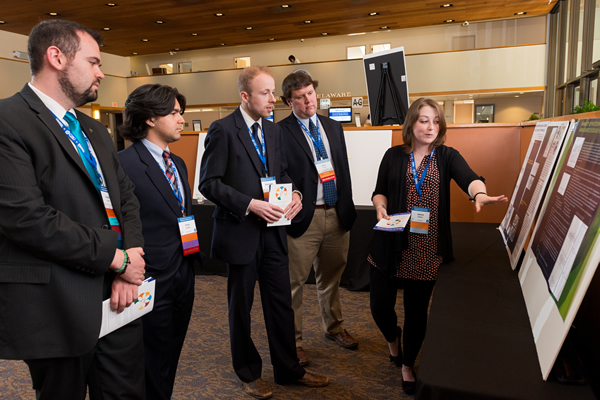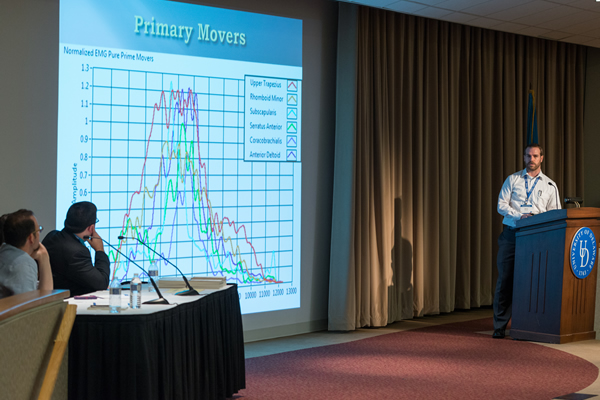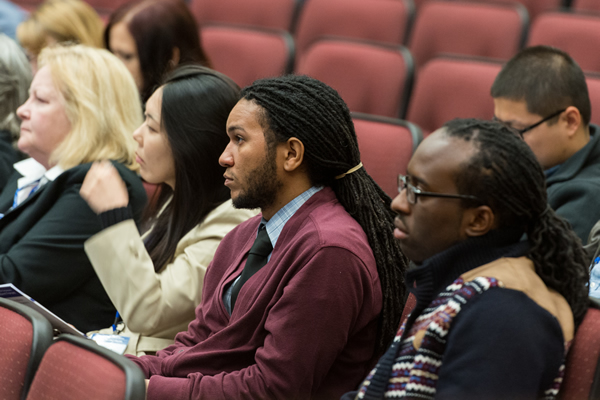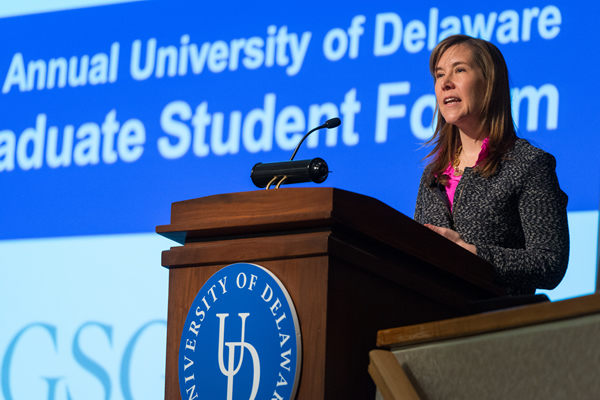


Making research matter
Forum challenges graduate students to apply their research
9:07 a.m., May 8, 2014--“Why do we engage in research?” attendees of the recent Graduate Student Forum were asked by the University of Delaware’s Bintong Chen, associate dean for research in the Alfred Lerner College of Business and Economics. Chen challenged them to frame their research in one of two ways: either as pure science, contributing to the accumulated knowledge of a given field, or as the development of practical solutions that contribute to the social good or improve the human condition.
With the conference theme "Making Your Research Matter, Within and Beyond the Academy,” this year’s Graduate Student Forum asked participants to highlight the broader impact of their work, and encouraged participants to apply their research talents both inside and outside academia.
Research Stories
Chronic wounds
Prof. Heck's legacy
Featuring over a hundred presentations — the largest number in the event’s history — the fourth annual Graduate Student Forum attracted nearly 300 graduate student, faculty and community attendees to the event at John M. Clayton Hall on April 23. The forum is sponsored by the UD Graduate Student Government (GSG) along with the Office of Graduate and Professional Education.
Presentations, posters and creative works showcased the breadth and depth of UD graduate students’ research efforts. Concurrent sessions focused on topics like “Language and Multicultural Research,” “Multidisciplinary Research About Vulnerable Populations,” “Museums, Material Culture and the Study of Everyday Life,” and “Discovering Our Oceans.”
Evening plenary presentations were selected to showcase interdisciplinary graduate research projects with public impact:
- James Goetschius, doctoral candidate in disaster science and management and a health facility planner for the U.S. Army, researches hospital survivability, and discussed planning and design tools that will help design teams better understand hospital functionality and plan for continuity of medical services during a disaster.
- Vinu Krishnan, doctoral candidate in materials science and engineering, discussed his studies in nanotechnology-based drug delivery. As part of a UD research group working with the Nemours Center for Childhood Cancer Research, Krishnan’s award-winning dissertation outlines how the leukemia-fighting drug Dexamethasone can be successfully encapsulated in nanoparticles, leading to improved survival and reduced disease symptoms.
- Axel Moore, doctoral candidate in biomedical engineering and 2013 Laird Fellow, discussed his work in developing an analytical model that provides an improved understanding of how articular cartilage functions, which has applications in clinical diagnosis, physical therapy and tissue engineering for diseases like osteoarthritis.
- Aaron Struminger, doctoral student in biomechanics and movement science, discussed his research on shoulder and elbow injuries in youth athletes, compared to existing studies on the same injuries in adult athletes.
GSG events committee chair Joseph Brodie was a key planner for this year’s forum. “This event is organized by graduate students for graduate students,” said Brodie, who is a doctoral student in marine science and policy. “The GSG worked to plan an event that will have a positive impact on the professional lives its student-presenters, who frequently take the feedback and presentation skills they acquire here and present their work at professional conferences across the country.”
“The Graduate Student Forum is an opportunity for UD administration, faculty, and graduate students to celebrate the richness and diversity of graduate student research,” added GSG president Chris Castillo, doctoral student in mathematical sciences. “We tend to focus so intently on our own research projects that we sometimes lack an understanding of other fascinating work happening on campus.”
While many graduate students have their sights set on academic careers in research and teaching, keynote speaker Susan Basalla encouraged her audience to think creatively about the variety of professional opportunities open to them. In a talk entitled “How to Find a Job Outside Academia (Even If You Aren’t Sure You Want One),” Basalla offered some key advice for graduate students considering nonacademic careers:
- Networking in your field is extremely important. You should be spending twice as much time making connections in and learning about your field as studying job openings.
- In addition to their discipline-specific expertise, graduate students must identify and market to potential employers the skill sets they’ve gained as a byproduct of their graduate education -- tools like research methodologies, analytical skills, and project management.
- Don’t underestimate the significance of nonacademic pursuits and interests, which may often lead to unexpected connections and opportunities.
A principal with the higher education executive search firm Storbeck/Pimentel and Associates, Basalla is the author of So What Are You Going to Do With That? Finding Careers Outside Academia.
The evening plenary keynote featured Emanuel Hatzakis, director of client strategies at UBS Wealth Management Americas, who discussed the relevance of graduate education in today’s economy.
James Richards, vice provost for graduate and professional education, enthusiastically credited the GSG for the event’s success. “The Graduate Student Forum provides students with the opportunity to present their work to the University community and to the public. For some students, this represented the first time they've presented their work in podium or poster form, and for others, it represented an opportunity to fine tune their work before presenting at national or international meetings.”
Added Richards, “The organization of the forum was absolutely professional, and I've received many positive comments from colleagues regarding the high quality of both podium and poster sessions.”
Article by Nora Riehl Zelluk
Photos by Evan Krape











